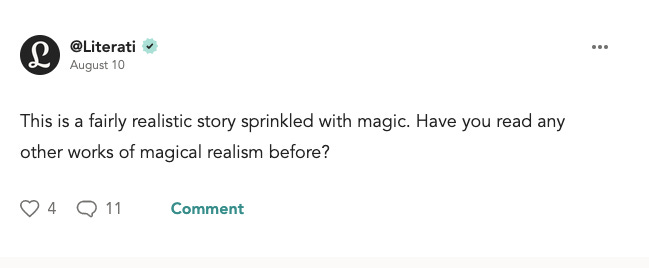Welcome to Midweek Dinner. There’s a whole story behind that name, something about the way Wednesday creeps up on you, and you have to cobble together a meal out of whatever you can scrounge from the fridge. And yes, sometimes there is talk of food in this place. But mostly it’s about what I’ve been reading, in print and online; or what I’ve been thinking, in clarity and confusion; or what I am hoping, in fear and in joy. And you are always invited to join in.
—— The best conversations take place around the dinner table. — —
Recently, my local paper featured a human interest column about an area book club that has been going for 100 years. Dubbed the Review Book Club, this group gathers at the country club once a month, a time where they will visit, eat lunch, listen to a guest speaker, and then “get down to business.” You might assume that “business” would be the discussion of that month’s book, but no. This is no traditional book club.
Explained current club president Mary Helms: "We open the meeting [and] have a blessing. Lunch is served. Then, around the time we are enjoying dessert, we will stop talking and have a business meeting.
"After that, we have the minutes and treasurer's report. Then the speaker will be introduced, and we enjoy the speaker. Then we open to questions and then the meeting is adjourned."
Recent programs have ranged from an expert on the 1964 federal court trial of Jimmy Hoffa here to a cooking demonstration involving chef salads and olive oil.
But what about the books? They have a selection committee that chooses the roster of books for the year, and from what I can gather, a few copies of each title are purchased and distributed, and then each month, they just swap titles. The logistics here are mind-boggling as membership is capped at 421 (there is a waiting list2), but 42 divided by 12 equals 3.5, so this is no simple exchange. I would love to know how they decide who gets what title and how they arrange the swap. Or maybe they don’t really care that much? Maybe they just say, “hey, girl, you read this one yet? It’s ah-may-zing,” moving around the room with their tea and petit fours until they find a willing taker. Maybe they come in, drop the books on a table by the door like a phalanx of pastel gift bags at a baby shower, and then just grab a different one on the way out? The thing they most definitely do NOT do is review the books. That’s the first rule, in fact, the irony behind their cheeky name: the Review Book Club strictly prohibits Book Reviews. I assume they like books and actually read them because why else join a book club? Despite that presumed motivation, this club is not about the books. The columnist (an acquaintance of mine, actually) even calls the monthly book exchange “perfunctory.”
Books are most definitely not perfunctory in the vibrant and unexpected community that has coalesced online around the book clubs hosted by A Public Space. Some of you might recall that last Spring, I joined a group reading War and Peace. Hosted by A Public Space and writer Yiyun Li, this merry band started small but over the course of the weeks and months we spent reading #TolstoyTogether, our group — and our connections to one another — grew. Our reading stretched and evolved, and for many of us, these still, small moments in Tolstoy’s classic felt like a kind of salvation. During a dark and difficult time, readers all over the globe could see beyond their moment, could look up into an endless expanse of sky and see themselves as a tiny part of something much bigger than themselves.
From that experience, A Public Space decided to publish a book. Called Tolstoy Together: 85 Days of War and Peace with Yiyun Li, it chronicles our shared reading experience, and the launch was last night. Many of us at the virtual event with Greenlight Books are contributors to the book, and in some ways it was less a book launch and more a mini-reunion. The swirl of emotion that resulted was amazing. Author and fellow reader Jill Tartara put it best:

Or as Yiyun Li put it last night, reading is usually a solitary act, but this experience opened her to the idea of joining her greedy love of story with others who share that greedy love for books and stories, comparing herself to a lone whale joining up with a pod of whales swimming and surviving together. She said,
This reading, this Tolstoy Together reading, is actually reading with my pod, which is entirely different. … When you are in the pod, you feel the water, the current, the sceneries would be different, and that’s exactly how this was.
Consider, as a contrast, the new Literati book clubs, which tout themselves as “Book clubs unlike any other.” When the service launched this Spring, I joined at the Premium level, which automatically sends me a book every month from whichever celebrity-hosted club I choose. To ensure I’m interested in the title I receive, I’ve changed clubs almost every month, starting with the Atlas Obscura group before moving to the Cheryl Strayed selection and now to Jesmyn Ward’s pick for this month: Caul Baby by Morgan Jerkins. Of the three previous titles, I’ve only read 1 of them and didn’t like it very much. I’m keen on this month’s selection, but we’ll have to see if I can make room for it in my reading life. So, what’s the difference? Why does this service, for which I am paying, fall by the wayside so easily while reading War and Peace in a ragtag online book club had me so engaged?
For one, there is no set reading schedule, and the discussion is . . . frustrating. Here, for example, is how the Caul Baby discussion has been launched:
In response, people are just listing titles. On rare occasion, they might respond to one another, and in one inexplicable case, a man has replied,
“Magic Realism” isn’t magical. It’s real.
I don’t *think* this reader is intending their comment to be mean or dismissive, but it feels like much of social media: uninvited opinions, shouted into the void. There is no real sense of community there. Similarly, the hosts are detached from the experience, seeming to satisfy their obligation by hosting an interview with the author on instagram? Regardless, the experience leaves me uninterested in the discussion, so I’ve ended up with just another version of the Book of the Month club, which has never interested me. It all feels so irrelevant.
Yiyun, who reads War and Peace every year, invited us to join her in the Spring of 2020, giving us the chance to join our solitary reading experiences and create something communal. None of us knew then what might come. Being a rebellious non-joiner, my expectations were low, hoping merely to get this doorstop of a book read, getting at least some measure of accomplishment out of our stay-at-home season. Along the way, however, we managed to create real community, across time zones and generations, through differences of opinion and differences of translation. My time with those readers (and with a smaller group rereading Anna Karenina in the weeks after we finished W&P) will remain one of the most surprising and lovely experiences of my reading life.
In honor of the new book, Yiyun and A Public Space (and lots of readers from our first cohort) will be reading War and Peace again, alone in our individual homes, but with our pod, together. The new readalong begins September 15, and I will be participating. Want to learn more? You can watch the full video of the launch event or go to A Public Space, or click through to a few of my posts on the book and the experience:
Convinced? Get your hands on a copy (I’ll be returning to the Pevear and Volokhonsky translation). Your pod is waiting!
Unexpected Joy Department:
Reading Frederick Buechner’s Telling the Truth: The Gospel as Tragedy, Comedy & Fairy Tale, I came across the following passage:
The Yiddish word schlemiel has bene translated as the kind of person who is always going around spilling soup on people and a schlemozzle as the kind of person he is always spilling it on, and by that definition Abraham was a schlemozzle.
It goes on from there, blah blah blah something something about Abraham — but I’m no longer listening because my brain is one hundred percent now singing the theme song for Laverne & Shirley, and everything about that opening has now been thrown into a new light for me, look for my TED talk coming to an academic journal and a theater near you.
Write Much? Nah, Girl, I’m Good:
I’ve been pursuing some new review opportunities, which has been great. And though my Newbery project has definitely stalled (I will never make it by January, alas), I have a few new posts and a few more ready to draft. As fall has begun to assert itself on my psyche, I’m feeling a renewed sense of what’s possible, so I will hope to get back to more regular programming soon. Here, then, are the latest Newbery Medal Winner commentaries:
The Trumpeter of Krakow by Eric P. Kelly (more about post WWI America than about any trumpeter in Poland, IMO)
It’s Like This, Cat by Emily Cheney Neville (wherein I write more about this book’s publisher Ursula Nordstrom than about the book itself)
Earning Your Participation Grade:
Last week, I mentioned the soundtrack to your life. We all have one, right? We also all have favorite dishes or tasty beverages we make, perfectly suited to whatever mood we find ourselves in. Well, friends, I’m ready to have a dinner party, but the pandemic says not yet. So, click below to share with me a song on your soundtrack or a recipe you love, and I’ll pretend we’re at the longest of tables, the music spinning softly around us as we eat and tell stories and laugh heartily together.
Thanks as always for reading and thinking with me. If you have thoughts to share, just hit reply! I welcome your conversation and promise a response.
The “comfortable” capacity of the conference room at the country club.
The article explains that the waiting list is “typically activated when a member dies.” It also explains that the group’s youngest members are in their mid-60s.



